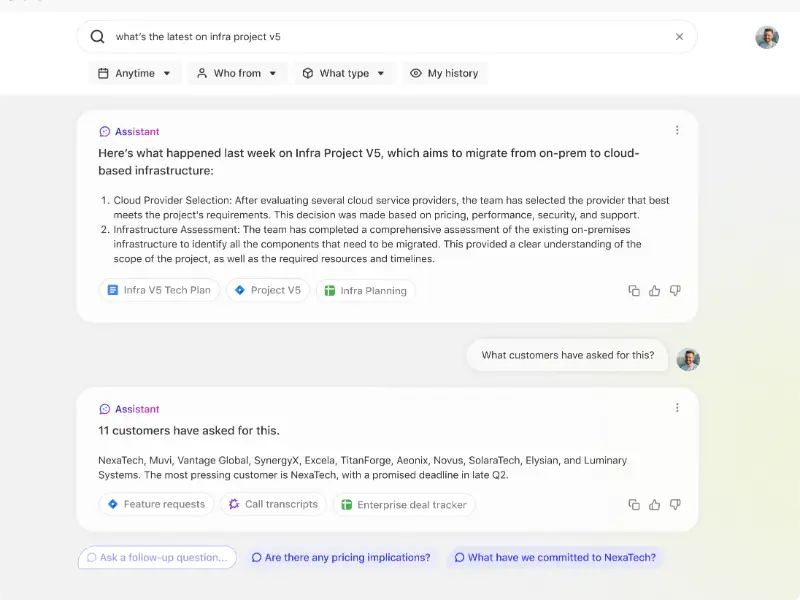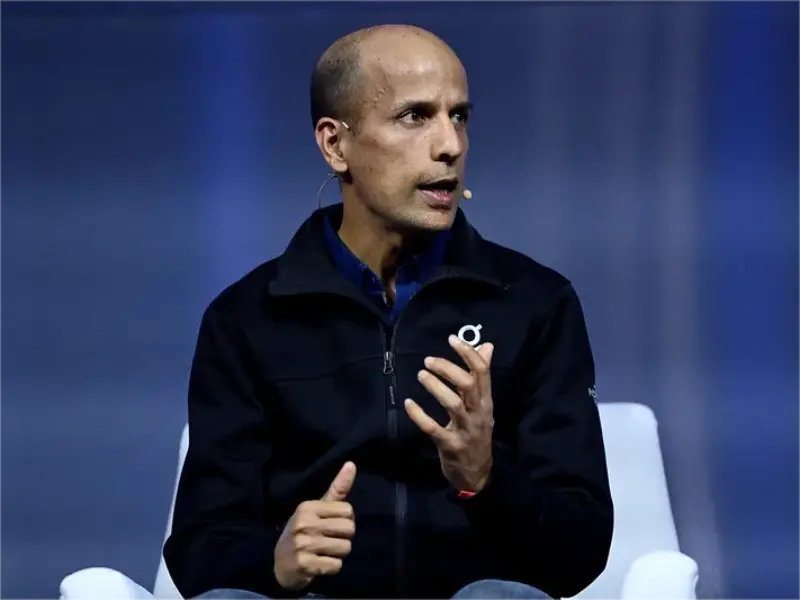- Arvind Jain is the founder and CEO of Glean, an AI-powered workplace search engine designed to enhance productivity by helping employees navigate company apps efficiently.
- Glean can index dozens of apps to understand context, language, behaviour, and employee relationships to find personalised answers to questions. The product builds on the company’s knowledge and content, with licensing and data governance in mind.
- Arvind revealed that Glean’s original vision of becoming the “Google” of professionals’ work lives has evolved into something much grander. In the future, every enterprise widely use these highly intelligent systems to take on heavy workflows.
Arvind Jain is the founder and CEO of Glean, an AI-powered workplace search engine designed to enhance productivity by helping employees navigate company apps efficiently.
Arvind Jain, discovering pain points from real practice
Arvind Jain is the founder and CEO of Glean, an AI-powered workplace search engine designed to enhance productivity by helping employees navigate company apps efficiently.
Arvind Jain is a graduate of the Indian Institute of Technology, Delhi and the University of Washington, USA. He joined Microsoft in 1997 as a Software Engineer, and two years later joined Akamai Technologies, a startup that provides a platform for businesses to work remotely, during the Internet boom and startup boom, and served as an architect for three years.
Arvind then joined Riverbed Technology as a founding engineer, gaining experience in how to build a business from scratch. Riverbed is the only company with the collective richness of telemetry from network to app to end user.
Arvind Jain has been with Google for 11 years since 2003 and was one of Google’s first engineers when it was still a private startup, serving as distinguished engineer and leading Google’s search, Maps and YouTube product teams.
In 2014, Arvind left Google to co-found Rubrik, one of the fastest-growing companies in cloud data management. But it had a problem in 2018 when productivity stagnated. The company’s output did not increase with its size.
Also read: Who is Bipul Sinha? Rubrik co-founder is an active investor and tech innovator
While leading Rubrik, Jain and his team leveraged a technology stack consisting of more than 300 cloud applications. With data scattered across so much software, Jain found his productivity hampered by the time it took to find the right information.
Jain realised that the problem was not specific to Rubrik, but pervasive, collating digital information from every aspect of the business seemed like an impossible task. Jain began researching enterprise search engines, but none of them could do what he imagined.
In Rubrik’s annual employee survey, Jain observed that finding information is the biggest productivity challenge people face. This became the inspiration for Glean, an AI-powered workplace search engine that aims to boost productivity by helping employees navigate company apps efficiently.
Glean, beyond the mere keyword matching
Arvind found Glean in 2019 to make it easy for people to find the information they need to be more productive and happier at work. Now a $2.2 billion unicorn, it targets enterprise accounts from its inception, aiming to provide solutions for complex tech stacks and internal inefficiencies within large organisations.
Many of Glean’s founding team used to work at Google. There, they had the good fortune to use Moma – a custom Intranet that indexes everything used internally at Google. So the problem Glean was trying to solve was clear: build a Google-like search system inside the company that could integrate information from hundreds of different SaaS applications.
Also read: Apple’s Search Engine Update Could Challenge Google’s Dominance
As a unified search product, Glean can index dozens of apps to understand context, language, behaviour, and employee relationships to find personalised answers to questions. The product builds on the company’s knowledge and content, with licensing and data governance in mind.
Glean is a layer on top of the company’s software applications, and users can interact through web apps, new tabs, sidebar search, native search, or Slack requirements. To deliver its core functionality, Glean retrains language models on the company’s unique knowledge base to foster a thorough understanding of content, language, people, and relationships.

The challenge of enterprise search has been an established problem for many companies trying to solve, so the circuit has been crowded, with major players including big tech companies like Microsoft, Google, Amazon, IBM, and Oracle, as well as companies focused on enterprise search. There are new companies like Glean, as well as companies like Coveo that have been established for more than a decade.
Thanks to Google’s new Transformer technology and the large language model available in the open domain, the Glean team can do something revolutionary: generate embeddings and build semantic search. In 2019, that’s almost unheard of.
For example, if a worker types “Show me X’s product manual” into Glean, the technology will show X’s user guide, X’s team manual, X’s product manual, and anything else based on semantic search matching, not just keyword matching.
Arvind’s vision for the future: universal intelligent assistants
Arvind adheres to the principle of “quality first”, believing that products should focus on achieving useful features in the early stages of development, rather than focusing too much on cost and performance. Just as they did when they created Glean, the priority is to ensure the product’s utility, and then gradually optimise latency and reduce costs.
Glean aims to revolutionise the way people work, hoping that every company employee will have a personal AI assistant that can not only respond to needs in time but also anticipate and solve various problems in advance.
Arvind revealed that Glean’s original vision of becoming the “Google” of professionals’ work lives has evolved into something much grander. The way forward for Glean is that in the future, every enterprise will widely use these highly intelligent systems to take on heavy workflows.
The integration of enterprise search capabilities with generative AI has become Glean’s superpower. “CIOs and knowledge workers have been waiting for an enterprise AI product that can understand workplace knowledge,” said Sonya Huang, Sequoia partner and Glean’s board member. “Glean has spent years refining algorithms to translate enterprise knowledge into search algorithms and is now in the right place at the right time in generative AI.”
For Jain, Glean’s challenge was not just developing the product, but growing into CEO and leading the entire company. Jain met this challenge by drawing on traits from his parents: his father’s confidence and practice of interacting with others, and his mother’s way of dealing with conflict by prioritising listening and never saying “I told you so.”

